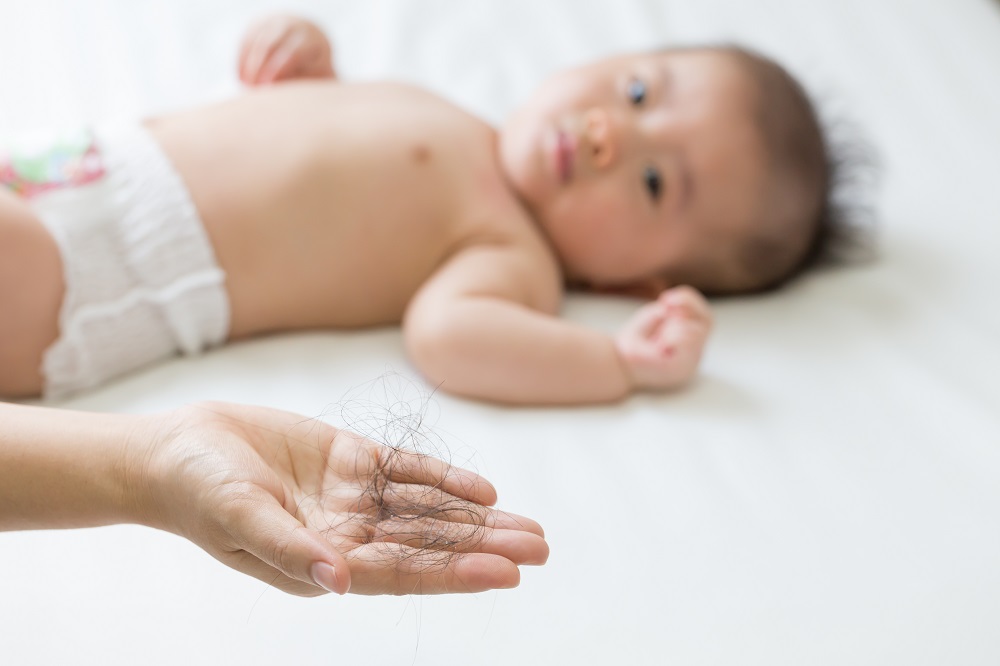Becoming a new mom is a joyous and transformative experience, but it often comes with unexpected challenges.
One such challenge that many new mothers face is postpartum hair loss. In fact, around 40-50% of women experience postpartum hair loss to some extent. While it can be disheartening to see clumps of hair in the shower drain or on the pillow, it’s essential to understand that postpartum hair loss is a common and temporary condition.
In this article, we’ll discuss why you experience postpartum hair loss and tips to cope with and manage this phase. So, let’s begin:
Why Does Postpartum Hair Loss Happen?
Postpartum hair loss is also known as telogen effluvium, and it occurs due to hormonal changes after pregnancy.
Throughout pregnancy, elevated estrogen levels extend the hair’s growth phase, resulting in thicker locks. However, after childbirth, estrogen levels rapidly drop, prompting a larger number of hair follicles to enter the resting phase. This shift leads to increased hair shedding, typically experienced between three to six months postpartum.
While it is upsetting for you, it is a natural part of the post-pregnancy adjustment.
6 Simple Tips for Coping with Postpartum Hair Loss
1. Eat a Well-Balanced Diet
We all know how beneficial a well-balanced diet is for our overall health. However, for women dealing with postpartum hair loss, eating a well-balanced diet can stop hair loss from getting worse.
Make sure to consume a diet rich in all the essential nutrients like vitamins and minerals, particularly iron, zinc, and biotin. Some of the best foods to eat include:
- Hemp seeds
- Beef liver
- Nuts and seeds
- Lentils
- Chickpeas
- Eggs
- Fish
- Sweet potatoes, etc.
These nutrient-rich foods can support hair growth and help you maintain overall health.
2. Stay Hydrated Throughout the Day
Most importantly, make sure to keep yourself hydrated throughout the day. Aim to drink at least 7-8 glasses of water per day. Know that hydration supports the function of hair cells and aids in nutrient transportation to the hair follicles.
If you’re a working mom, keep a water bottle with you to remind yourself of drinking water. However, you can also stay hydrated by eating foods that are rich in water content. Some of them include cucumber, celery, pineapples, watermelon, strawberries, oranges, peaches, etc
3. Consider Hair Transplant
Despite all your efforts, if the hair loss problem still persists, then it’s time to consider the hair transplant procedure.
A hair transplant involves transferring hair follicles from one part of the scalp (usually the back or sides, where hair is more resistant to hormonal changes) to the areas experiencing thinning or loss.
However, before undergoing a hair transplant, it is wise to consult with professionals like hair transplant by Dr. Wise to know whether you’re the right candidate or not. He can assess the extent of your hair loss, discuss potential causes, and determine whether you are a suitable candidate for the procedure.
4. Manage Stress
Managing stress is crucial for new moms coping with postpartum hair loss. You can do so by incorporating relaxation techniques like deep breathing, meditation, or gentle exercises such as yoga into your daily routine.
Also, prioritize adequate rest and consider delegating tasks to others to lighten your load. Seeking emotional support from friends, family, or support groups can also alleviate stress.
Remember, a stress-free environment positively impacts overall well-being, promoting better mental and physical health during this transformative period of motherhood.
5. Take Supplements and Vitamins
If you’re worried about your postpartum hair loss, then consult with your doctor about taking supplements or vitamins.
Some of the best vitamins and supplements include:
- Vitamin B complex or Biotin (B7)
- Iron
- Vitamin C
- Vitamin E
- Zinc, etc.
Just be sure to talk to a professional doctor before taking any of these supplements.
6. Be Patient
Patience is key when dealing with postpartum hair loss. Understand that this temporary condition is a natural part of the post-pregnancy adjustment.
While it may be disconcerting, remember that hair will gradually return to its normal growth cycle. Stress can exacerbate the condition, so maintaining a positive mindset and focusing on the joys of motherhood can help ease the emotional impact.
Summing Up
Coping with postpartum hair loss requires a combination of self-care practices, a healthy lifestyle, and patience.
By following these simple tips, you can navigate this temporary phase with greater ease, allowing them to focus on the joy and challenges of motherhood.
Remember, seeking support, both emotionally and professionally, is essential, as many women share similar experiences during this transformative period of their lives.

